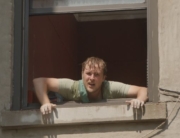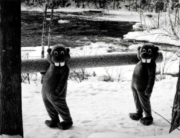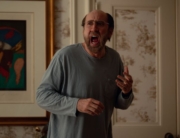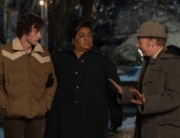
Jackson Hurst & Rachel Nichols (Photo: Richard Foreman Jr./Paladin)
Directed by Margaret Whitton
Produced by Steven Tabakin &Whitton
Written by Roger Towne, based on the novel The Loop by Joe Coomer
Released by Paladin
USA. 98 min. Not Rated
With Jackson Hurst, Rachel Nichols, Linda Emond, Buck Henry, Judith Ivey, Phyllis Somerville, Erik Jensen, Matte Osian, Rocco Sisto & Louis Zorich
A Bird of the Air is a lovely little modern screwball comedy that only hard-hearted cynics will resist.
Lyman’s life is in a predictable pattern. For years the practical, solitary man (Jackson Hurst) has worked the night shift patrol along a New Mexico highway loop, helping with emergencies and ensuring safety, until two unpredictable forces invade his stable life, blowing it off course. First, a parrot flies into his trailer, and he becomes fascinated with the phrases and sounds it repeats almost conversationally: “Shut up!” “Give some to the parrot,” and “Speak for yourself.” Then there are the mysterious sayings—“I’m an eagle!” “Brrring MA 17,” and “Prepare to meet your maker”—that might link to the parrot’s past owners, but which Lyman comes to believe somehow speak to him about his own isolated life and future direction.
When he bones up on parrot care at the library, a pretty, outrageously flirtatious, and obnoxious librarian, Fiona (Rachel Nichols), relentlessly hones in on him. Clearly not used to being ignored, she takes him on as a challenge. She finally gets him to pay attention to her by tempting him with her skills to decode the parrot’s messages, beginning with the Biblical source for the parrot’s longest declaration: “A bird of the air shall carry the word.” When she follows Lyman home, the parrot has a ready response, a wolf whistle, prodding Lyman to get over his disapproval over her messy, unsafe car (symbolic of her lifestyle) and respond to her sex appeal.
With more than a comic nod to the Hepburn/Tracy library-set Desk Set (1957), the two look for clues in libraries to the parrot’s past owners, ostensibly to return the bird. In another wink to those classic screwball romances where the movie star’s beauty supposedly hides behind clunky librarian’s glasses, here it’s the guy who is hunkered under a grimy cap and fluorescent overalls until the librarian strips him down to reveal the hunk underneath (and Hurst is quite the eye candy). But when the fanciful Fiona finds she can’t deal with the grim reality Lyman faces nightly out on the highway patrol, he becomes even more obsessed with solving the parrot’s origins, and persistently tracks down every clue she identified, hoping to win her back by conducting a genealogical-like research back through the decades of the parrot’s owners.
As combustible as the chemistry between the two attractive young stars may be, an unexpected bonus comes with the delightful stream of old pro’s appearing as the parrot’s previous owners. Margaret Whitton was the film’s producer before she decided to make her directing debut, so she can take credit for the sparkling casting of the likes of Buck Henry, Judith Ivey, Louis Zorich, among several other master storytellers. Each briefly but zestfully recounts the name they bestowed on the parrot, what he meant to them, and why they had to pass it on. One by one, each solves how a phrase was added to the parrot’s repertoire, while imparting a colorful life lesson to Lyman that will help move him out of his rut (and into Fiona’s changing orbit).
Roger Towne’s adaptation of Joe Coomer’s (a bit sexier and bruising) novel The Loop slips over a couple of rough patches. The intermittent voice-over narration by the graveyard shift waitress (Linda Emond) adds an unnecessary mother figure; Lyman’s missing background leaves a confusing impression at first that he’s virginal rather than a loner; and the climactic incident that so traumatizes animal loving Fiona seems contrived rather than an experience that Lyman has had to steel himself against frequently. But the talking parrot, and the engaging people he brings together, create more romantic sense and sensibility than the talking cat and her would-be owners in Miranda July’s recent The Future, and should particularly appeal to folks who, like me, found that film just too self-consciously hip to take to heart. As the pet here says: “Mmmmmmmm, good.”






Leave A Comment